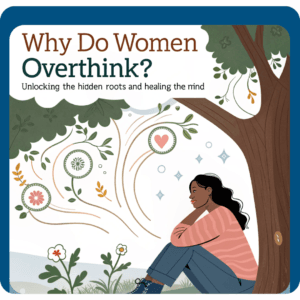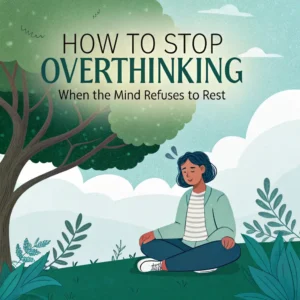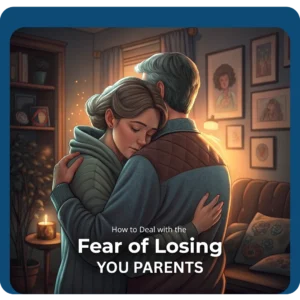Why Can’t I Stop Overthinking?: The Hidden Link Between Anxiety and Your Inner Child
Table of Contents
Introduction: The Endless Loop of ‘What Ifs’
You replay that conversation in your head for the fifth time.
You write a reply, delete it, rewrite it, and still don’t send it.
You lie awake at 2:47 a.m., analyzing everything—from a colleague’s side glance to your 5-year career plan.
Sound familiar?
Overthinking is the art of creating problems that don’t exist—except in your own mind. And when paired with anxiety, it becomes a mental loop with no exit door.
Here’s the twist: your overthinking isn’t just a bad habit.
It’s often a wounded inner child calling out for safety, certainty, and control.
If you’re tired of racing thoughts, emotional spirals, and the guilt of not being able to stop, this article is your invitation to finally understand and untangle what’s really going on beneath the noise.
What Is Overthinking—and Why Do We Do It?
Overthinking isn’t just worrying. It’s obsessive mental overactivity—thinking about the same situation from every angle until you’re exhausted but still not at peace.
According to a study published in Journal of Abnormal Psychology, overthinking (also called rumination) increases vulnerability to depression, anxiety disorders, and even insomnia. (Nolen-Hoeksema, 2000)
In India, it shows up in culturally specific ways:
- Replaying “log kya kahenge” scenarios in your head
- Constant self-correction to avoid conflict or shame
- Obsessing over marriage, family roles, financial pressure, or academic results
We normalize it. We even glorify it as “being cautious” or “responsible.” But truthfully?
Overthinking is a trauma response.
The Inner Child’s Role in Overthinking
Remember being scolded for asking too many questions?
Being told “Don’t talk back” when expressing doubt?
Or being praised only when you excelled—never when you were simply you?
That’s where the root of overthinking often begins.
The inner child is the emotional part of you that absorbed beliefs, fears, and wounds during childhood. When that child didn’t feel safe, heard, or loved unconditionally, they created patterns to survive.
One of those patterns? Overthinking.
Your inner child learned:
- If I think hard enough, I can avoid pain.
- If I anticipate every scenario, I won’t be rejected.
- If I stay alert, I won’t be caught off-guard.
Now, as an adult, that old strategy is still running. Even when it’s no longer helpful.
How Anxiety Fuels the Overthinking Cycle
Anxiety is the fuel, overthinking is the fire. Together, they create:
- Chronic decision fatigue
- Social hypervigilance
- Physical symptoms like headaches, chest tightness, and exhaustion
- Emotional burnout and numbness
A 2022 survey by The Center for Healing India revealed that 63% of Indian women in urban areas report “excessive thinking” as their primary mental health struggle—often masked under productivity or politeness.
This isn’t because you’re weak. It’s because your nervous system is stuck in survival mode.
And your mind is just trying to keep you safe, the only way it knows how—by controlling every variable.
So How Do You Heal Overthinking and Anxiety at the Root?
- Personal Inner Child Healing Sessions
These one-on-one sessions help you reconnect with the inner child holding the original wound—whether it’s fear of failure, rejection, or abandonment.
💬 In a session with Sonali Mittra, you might explore:
- “When did I first feel the need to control everything?”
- “What emotion was unsafe in my childhood?”
- “What does my younger self need to hear right now?”
The shift? You go from trying to control the world… to feeling safe in your body and emotions.
🔗 Book your session at www.sonalimittra.com/contact
✨ 2. Join the Inner Child Healing Masterclass
A powerful 90-minute masterclass for women who overthink, over-give, and over-perform—yet still feel emotionally stuck.
In this session, you’ll:
- Learn how the subconscious mind is wired through childhood
- Discover which inner child type (The Pleaser, The Perfectionist, The Fixer, etc.) you carry
- Practice a guided healing to calm your inner critic and reconnect with emotional safety
Find out more here: www.sonalimittra.com/contact
✨ 3. Family Constellation Therapy
Sometimes your overthinking isn’t even yours.
It’s inherited. Generational.
Through Family Constellation Therapy, we explore unconscious loyalties to family patterns like:
- Guilt that’s not yours
- Hyper-responsibility inherited from a parent
- Repeating trauma cycles like fear, scarcity, or suppression
When these hidden dynamics are revealed, you find clarity—not from more thinking, but from energetic resolution.
✨ 5. Access Bars Therapy: A Mental Reset Without Trying
For those too exhausted to “do the work,” Access Bars is a perfect entry point.
Through 32 gentle touch points on the head, Access Bars therapy helps:
- Calm the monkey mind
- Quiet the fight-flight-freeze response
- Clear subconscious clutter
- Release the obsessive thinking loops
It’s like defragmenting your mental hard drive—without having to talk or process.
Clients often report better sleep, spontaneous ease, and reduced anxiety in just one session.
🔔 Try a session or learn to become a Bars practitioner at our next Access Bars Workshop at The Healing Room.
Final Thoughts: Overthinking Is Not a Flaw—It’s a Flag
The mind overthinks when the heart feels unsafe.
If you’ve been stuck in a cycle of rumination, anxiety, and self-doubt…
Know that your mind isn’t broken. It’s doing its best with outdated survival strategies.
But you don’t have to stay in this loop.
You can learn to think less and feel more.
You can stop managing your emotions and start meeting them.
You can heal the past so the present doesn’t feel like a threat.
And it starts with reconnecting to the one part of you that always wanted to be heard—your inner child.
Ready to quiet the mind and come home to peace?
Final Thoughts: Overthinking Is Not a Flaw—It’s a Flag
The mind overthinks when the heart feels unsafe.
If you’ve been stuck in a cycle of rumination, anxiety, and self-doubt…
Know that your mind isn’t broken. It’s doing its best with outdated survival strategies.
But you don’t have to stay in this loop.
You can learn to think less and feel more.
You can stop managing your emotions and start meeting them.
You can heal the past so the present doesn’t feel like a threat.
And it starts with reconnecting to the one part of you that always wanted to be heard—your inner child.
Ready to quiet the mind and come home to peace?
Join our Inner Child Healing Sessions, sign up for the Masterclass, or attend an Access Bars Workshop at The Healing Room.
Let’s turn down the volume on anxiety—and turn up the frequency of clarity, ease, and emotional freedom.
🧠 Details & registration at 👉 www.sonalimittra.com




Wow, this article truly hit home. It’s eye-opening to read that overthinking isn’t just a bad habit—it’s often linked to our inner child coping with anxiety and unmet needs during childhood
This post really opened my eyes to how much overthinking is tied to inner child wounds. I’ve never connected my anxiety to those old patterns before. Thank you for explaining it so clearly—it feels like the first step toward real healing.
I resonated with so many points here — especially the idea that our inner child keeps replaying old fears, causing overthinking. This has motivated me to look deeper within and try to heal, not just manage symptoms